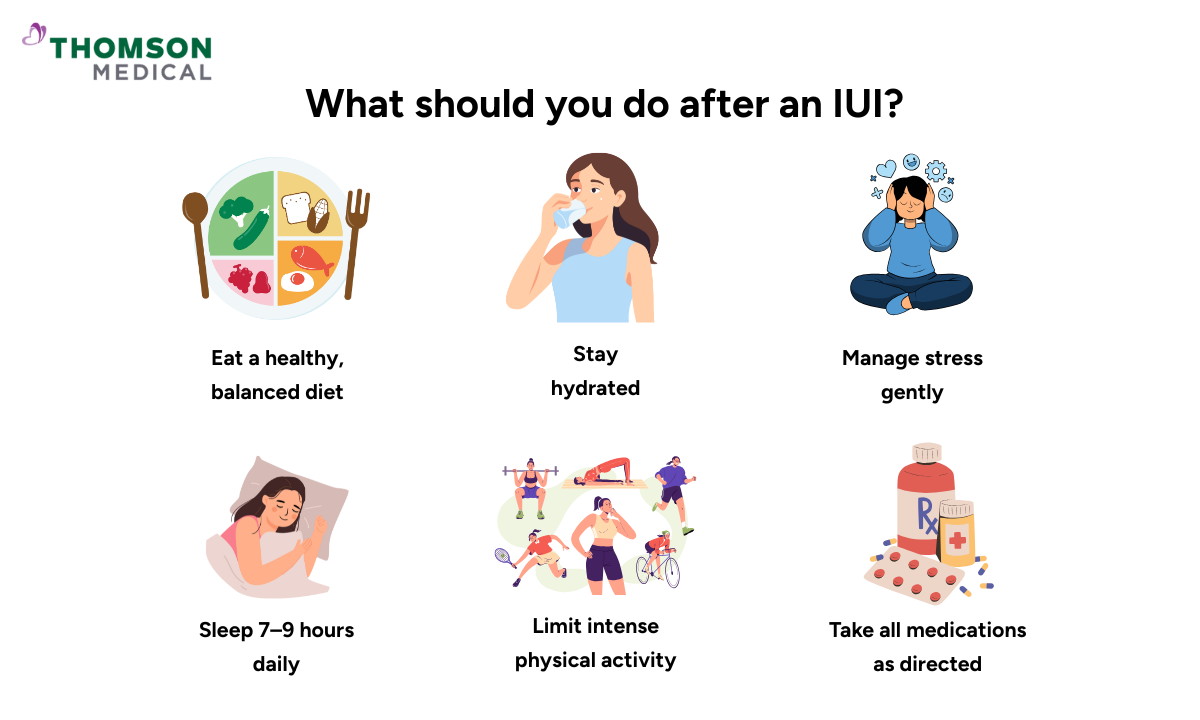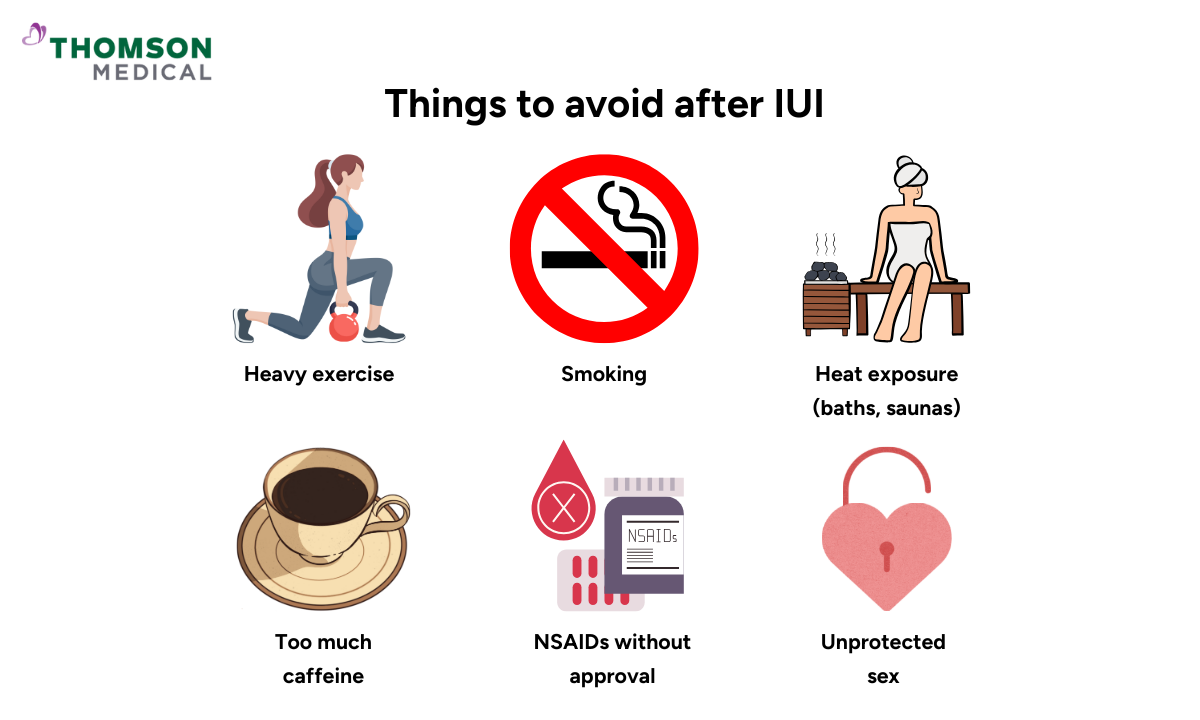You’ve just gone through an intrauterine insemination (IUI), and now comes the wait, filled with hope, questions, and maybe a bit of anxiety. As you try to go about daily life, you might catch yourself wondering, “Is it okay to unwind with a drink?”
It’s natural to have this question, because you want to have the best chance of conception. Here's what you need to know about drinking alcohol after IUI.
What should you do after an IUI?

After an IUI procedure, it’s helpful to focus on healthy habits that support your well-being during the two-week wait. Here are some tips for you to consider:
Eat a balanced, anti-inflammatory diet with vegetables, fruits, whole grains, lean protein, and healthy fats
Take any prescribed supplements such as folic acid, vitamin D, or CoQ10
Manage stress through light yoga, meditation, or calming activities you enjoy
Get 7-9 hours of quality sleep each night
Avoid taking an early pregnancy test until 2 weeks after your procedure to prevent false positives and negatives.
Avoid strenuous workouts, heavy lifting, or other high-impact activities
Take all prescribed medications, including progesterone if recommended by your doctor
These simple steps may help support a healthy environment for implantation and ease your mind during the wait.
Can you drink after an IUI?
It’s recommended to avoid alcohol after an IUI, particularly during the two-week wait, as it may affect implantation and early pregnancy.
How alcohol affect your chances of conception
While one occasional drink may not directly affect the implantation process, studies suggest that alcohol can lower fertility by:
Affecting early embryo development
Reducing implantation success rates
Disrupting hormone levels (such as oestrogen, LH, and FSH)
Interfering with ovulation and the timing between your ovulation and the next period (luteal phase)
Even moderate alcohol intake (as little as 1-5 drinks per week) has been linked to lower pregnancy rates during fertility treatments like IUI and IVF.
Can a small amount of alcohol affect implantation?
Yes, even small amounts of alcohol may impact the early stages of pregnancy. Implantation typically occurs 6-10 days after IUI, when the embryo attaches to the uterine lining.
Alcohol may interfere with this process by affecting hormone balance, blood flow, and immune response, which are crucial for successful implantation.
Our IUI specialists
Loading...
Things to avoid after IUI

After an IUI, your body needs time to rest and recover. Knowing what to avoid can help create the best possible environment for implantation. Some key things you should avoid after IUI:
Strenuous exercise or heavy lifting in the first 1 to 2 days
Smoking or being exposed to cigarette smoke, which can reduce implantation success
Hot baths, saunas, or jacuzzis due to potential heat stress
Consuming too much caffeine, limit to under 200 mg per day (about 1-2 cups of coffee)
NSAIDs like ibuprofen, unless approved by your doctor
Unprotected sex, if advised against due to infection risk or uterine sensitivity
What you should do to support conception
While the two-week wait can feel long and uncertain, small everyday choices may help create a more welcoming environment for implantation. Here are a few gentle tips to keep in mind:
| Action | Why it helps |
|---|---|
| Take prenatal vitamins | Supports early foetal development |
| Stay calm and relaxed | Reduces cortisol and supports hormonal balance |
| Eat anti-inflammatory foods | May enhance uterine receptivity |
| Avoid alcohol and smoking | Protects the embryo and improves implantation chances |
| Track symptoms cautiously | Encourages awareness without overanalysing normal body changes |
| Wait 14 days before testing | Prevents you from being stressed due to false positives or negative results |
To help you achieve your fertility goals and maintain your conception chance after IUI, request an appointment with Thomson Medical. Our fertility specialist can help by providing you tailored lifestyle choices that support your fertility journey.
FAQ
Can I drink alcohol during the two-week wait after IUI?
It’s recommended to avoid alcohol consumption during the two-week wait. While one drink may not directly harm implantation, alcohol can affect hormone levels and may interfere with early embryo development if pregnancy occurs. For the best possible support during this time, it’s safest to stay alcohol-free.
Does alcohol affect sperm quality for IUI?
Yes, alcohol consumption can negatively impact sperm health, especially with regular or heavy drinking. It may reduce sperm count and motility, increase DNA fragmentation, and alter hormone levels like testosterone.
It is advised for men to limit or stop alcohol at least 3 months before IUI, as sperm development takes around 74 days. While occasional light drinking is less concerning, abstaining is considered the safest approach when preparing for fertility treatment.
Does alcohol affect egg quality?
Yes, alcohol can negatively impact egg quality, especially with regular or heavy consumption. It may disrupt hormone levels, interfere with ovulation, and increase oxidative stress on cells, potentially reducing fertility over time.
If you’re trying to conceive or preparing for fertility treatments like IUI or IVF, limiting or avoiding alcohol is generally recommended to support optimal reproductive health.
Can a sip of alcohol affect implantation?
Possibly. Even small amounts of alcohol may disrupt the hormonal balance, reduce blood flow to the uterus, or affect endometrial receptivity, factors that are important for implantation.
While the risk of a single sip is low, implantation usually occurs 6–10 days after ovulation or IUI, so it’s best to avoid alcohol during this time to minimise any potential impact.
What if I drank alcohol before I knew I was pregnant?
If you had a drink or two before realising you were pregnant, don’t worry. Many people consume alcohol in very early pregnancy without knowing they've conceived, and in most cases, occasional, light drinking does not cause harm.
If you're concerned about your conception chances, speak with your fertility specialist for personalised guidance on your specific fertility condition.
How many days of rest are needed after IUI?
No extended bed rest is required after IUI. You may rest for 10 to 15 minutes immediately after the procedure, as some clinics recommend this for comfort.
However, it’s best to take it easy for the first 24-48 hours,avoid heavy exercise or strenuous activity. After that, you can return to your usual routine unless your doctor advises otherwise.
The information provided is intended for general guidance only and should not be considered medical advice. For personalised recommendations and tailored advice, please consult a specialist at Thomson Medical. Request an appointment with Thomson Medical today.
